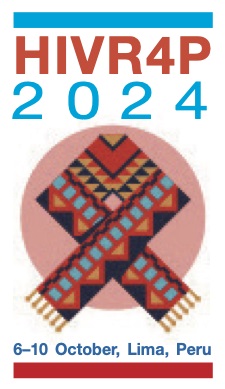HIVR4P 2024: Introduction
14 October 2024. Related: Conference reports, Treatment access, HIV prevention and transmission, Conference index, R4P 2024 Lima.
NOTE: free access to the online resources were made available on 12 December.
https://plus.iasociety.org/search/resources/convening/392
6–10 October 2024, Lima and hybrid
Introduction
Simon Collins, HIV i-Base
 The 5th IAS HIVR4P (Research for Prevention) conference is being held in Lima, Peru from 6–10 October 2024, and also as a hybrid meeting.
The 5th IAS HIVR4P (Research for Prevention) conference is being held in Lima, Peru from 6–10 October 2024, and also as a hybrid meeting.
i-Base is only able to attend the virtual conference this year and so reports will be limited to this perspective.
Highlights will include new results of lenacapavir 6-monthly injections as PrEP in cis gay men, transgender and gender-diverse people in a large international phase 3 study. Efficacy and safety will be remarkable – with results likely better than a vaccine – but access issues will dominate the discussions.
Lenacapavir is actually more effective than an HIV vaccine, with better protection from two shots a year and no issues of hesitancy. The urgency of global access demands an exceptional approach. Forty years of vaccine research should have included a plan for what to do when it arrives and this is the plan we need now.
It is easy to report other optimistic and exciting news from R4P but the timeline for broad access to many new drugs for prevention is still often years. As background, we include an article by Richard Stern that highlights extremely low access to oral PrEP across Latin America, including in countries that took part in the original iPrEX study from 2010 that led to US approval in 2012.
Peru was included in iPrEX and yet with a population of over 33 million and almost 100,000 people living with HIV, less than 1300 people used oral PrEP in 2023. This report includes that last year, among 430 million people in 16 countries, only 46,000 people were using oral PrEP.
Many of the presentations will focus on access and uptake to the two-monthly intramuscular injections of long-acting cabotegravir, which is now technically approved in a growing number of countries, including the UK, but where access is still extremely limited, including in the UK.
R4P is also likely to include an impressive range of pipeline formulations and alternative ways of delivering HIV treatments to prevent HIV infection. Often these gel, patch, injection, douche, pill, ring and film formulations are being developed by independent researchers as well as the companies that make the active drugs. Sometimes these are combined with contraceptives.
Access has also been raised as an issue for the conference which although rightly taking place for the first time in Peru, is being held exclusively in English, and without translations to Spanish or Portuguese, limiting participation from the host and neighbouring countries.
The conference website includes open access to the programme but not to other conference material until after the conference.
https://programme2024.hivr4p.org
Abstracts are published as an open access supplement in JIAS.
https://doi.org/10.1002/jia2.26351
Hopefully some sessions will be prioritised for immediate open access, rather than being held behind a paywall for several months, as happened with the IAS AIDS conference held in Munich in July.
Early i-Base reports will be linked below.
- Lenacapavir PrEP in cisgender gay men, trans and gender-diverse people: results of the PURPOSE 2 study
- Urgency of planning broad vaccine-like access to lenacapavir PrEP globally
- HIVR4P 2024: Context of PrEP in Latin America
- Impact on CD4 counts of once-monthly islatravir in PrEP studies: early macaque results with MK-8527 follow-on compound
- HIVR4P 2024: Context of PrEP in Latin America
This report was first published on 7 October 2024.

